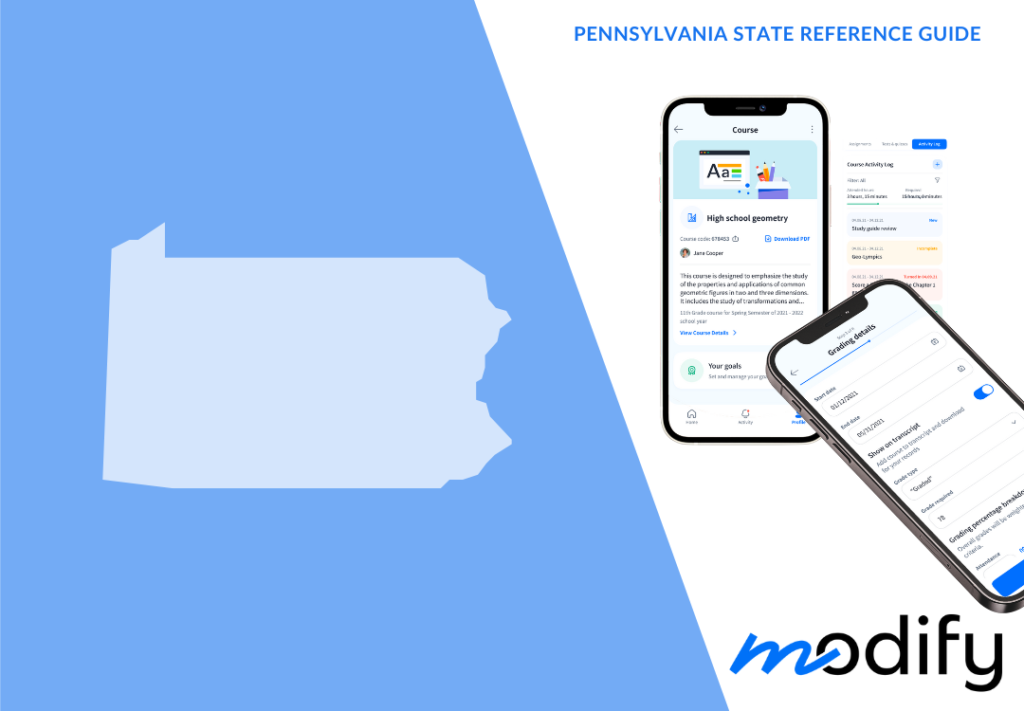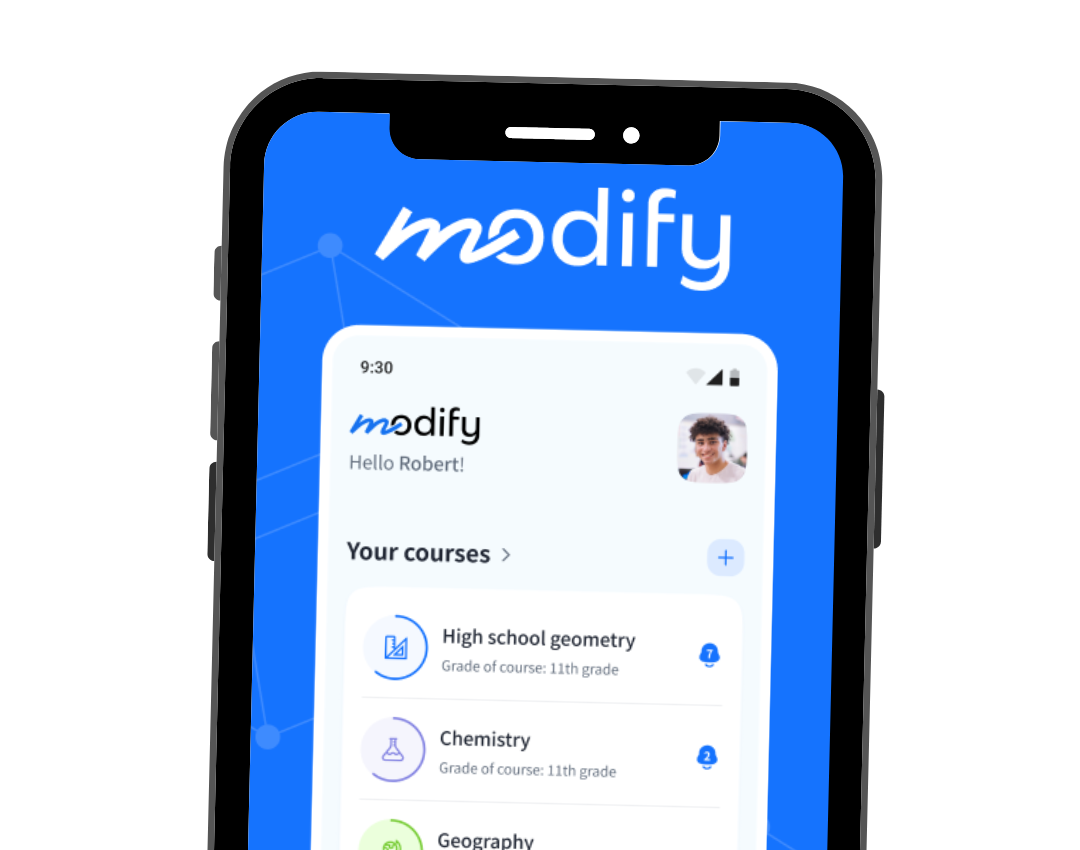Pennsylvania Homeschool Laws
Homeschooling in Pennsylvania
How do I start homeschooling?
The steps to homeschooling in Pennsylvania begin with the following:
Meeting minimum requirements for home educators including having a high school diploma or equivalent and no major criminal offenses on record in the previous five years.
Submitting a notarized affidavit of required information to the local school superintendent.
Choose an an ideal homeschooling method/curriculum for your family.
Modify™ can help you with your tracking, portfolio and record keeping. Download the app today.
Enjoying learning together!
Homeschool Laws
According to Pennsylvania Statute 1327, “Except as hereinafter provided, every child of compulsory school age having a legal residence in this Commonwealth, as provided in this article, and every migratory child of compulsory school age, is required to attend a day school in which the subjects and activities prescribed by the standards of the State Board of Education are taught in the English language.”
“Through the enactment of Act 16, the definition of compulsory school age was changed to “the period of a child’s life from the time the child’s parents elect to have the child enter school and which shall be no later than 6 years of age until the child reaches 18 years of age. The term does not include a child who holds a certificate of graduation from a regularly accredited, licensed, registered or approved high school. 24 P.S. §13-1326” (Pennsylvania Department of Education).
Per the Pennsylvania Department of Education, “In 1988, the Pennsylvania General Assembly passed Act 169 (Senate Bill 154), amending the Pennsylvania School Code. It amended section 1327, Compulsory School Attendance, to define a properly qualified private tutor and to allow a parent, guardian, or person having legal custody of a child to home school their children as an option for complying with compulsory school attendance. It added section 1327.1, Home Education Program, to specify the rights and responsibilities of the parents and the school district where the family resides.”
What do I need to be eligible to be a homeschool parent?
“The supervisor of the home education program must have a high school diploma or its equivalent. Examples include a diploma awarded by a home education supervisor after October 31, 2014 or a diploma awarded by an approved diploma-granting organization (Act 196 of 2014); or a Commonwealth Secondary School Diploma awarded by passing a high school equivalency test or completing 30 college level credits from a United States accredited postsecondary institution” (Pennsylvania Department of Education).
“A parent has no legal requirement for any particular skill or certification to homeschool a child with special needs. The only limitation is that their affidavit must address the specific needs of the child and be approved (24 P.S. § 13-1327(d))” (Pennsylvania Department of Education).
Also, in order to homeschool in Pennsylvania, “all adults living in the home and persons having legal custody of a child or children must not have been convicted of the criminal offenses itemized in 24 P.S. §1-111 (e) within five years immediately preceding the date of the affidavit” (Pennsylvania Department of Education).
Do I need to notify the school district of my intent to homeschool my child?
Yes! “The homeschool supervisor must submit the notarized affidavit and other required documents to the school district before starting a homeschool program. If there is an intention to continue to homeschool, the homeschool supervisor must complete a new affidavit for each student” each year (Pennsylvania Department of Education).
“In addition to the notarized affidavit, the parent, guardian or legal custodian must attach:
- an outline of proposed education objectives by subject area,
- evidence (records or a letter from the physician) that the child or children have been immunized as required by School Code Sec. 1303(a) unless a physician certifies the child has a medical contraindication to immunization and
- evidence (records or a letter from the physician) that the child or children have received medical services required for students of the child’s or children’s age or grade level in Article XIV, or religious exemption for these two requirements” (Pennsylvania Department of Education).
“The affidavit covers the school year (July 1 – June 30) and must be submitted to the superintendent’s office no later than August 1 of each school year a child is homeschooled. The exception is the first year a student is homeschooled; that year the home education program may begin at any time, as soon as an affidavit and supporting documentation is submitted” (Pennsylvania Department of Education).
Sample affidavits are available for Elementary or Secondary programs.
What educational options are available to my homeschooler?
You do have options as a homeschool family. For example, “parents have a legal right to borrow copies of the school district’s own planned courses, textbooks and other curriculum materials appropriate to the student’s age and grade level; these are provided free of charge” (Pennsylvania Department of Education).
There are also many alternatives to public school in Pennsylvania. See the Home Education and Private Tutoring Guide for more information on a variety of options and to specifically compare private tutoring versus home education. “One strategy for parents is to have their children privately tutored through eleventh grade and then switch to homeschooling in twelfth grade so that the student can obtain a state-recognized high school diploma. If this strategy is followed, the parent will need to ensure that the private tutor structures the student’s education in such a way as to complete the requirements for graduation from a home education program” (Pennsylvania Department of Education).
“Some options provide both curriculum and secondary oversight of the work (parents exercise primary oversight); these options are referred to as “umbrella schools.” When using an umbrella school, care must be taken to ensure the mandatory courses and graduation requirements defined by law are met; specific programs may need to be augmented to ensure this” (Pennsylvania Department of Education).
“A school district may allow students that are homeschooled or being privately tutored to attend classes in the district’s schools or a career and technical educational program. […] This provision of services is at the discretion of the school district of residence and not mandated. Review your local school district’s policy or contact your local school district home education coordinator for additional information” (Pennsylvania Department of Education). Similarly, “Homeschool students may take selective classes from a private school, but this is at the discretion of the private school” (Pennsylvania Department of Education).
“Concurrent enrollment is a program administered and developed by a school entity (such as a school district or an area career and technical educational school) and an eligible postsecondary institution that allows students to concurrently enroll in postsecondary courses and to receive both secondary and postsecondary credit for that coursework. The term includes an early college high school program, a gateway to college program or a middle college high school program (24 P.S. § 16-1602-B “Concurrent enrollment program”). Concurrent enrollment programs are open to students who are enrolled in a school district, a charter school, an area career and technical educational school, a nonpublic school, a private school or a home education program (24 P.S. § 16-1602-B “Concurrent student”)” (Pennsylvania Department of Education).
Homeschool Requirements
Because Pennsylvania does highly regulate homeschooling, there are Pennsylvania homeschool requirements you must satisfy when you homeschool:
- Begin homeschooling by age 6.
- Submit the Home Education Affidavit for Elementary or Secondary homeschool students.
- Teach the required subjects:
- “Elementary school level (grades K-6), mandatory courses: English, to include spelling, reading and writing; arithmetic; science; geography; history of the United States and Pennsylvania; civics; safety education, including regular and continuous instruction in the dangers and prevention of fires; health and physiology; physical education; music; and art.
- Secondary school level (grades 7-12), mandatory courses: English, to include language, literature, speech and composition; science; geography; social studies, to include civics, world history, history of the United States and Pennsylvania; mathematics, to include general mathematics, algebra and geometry; art; music; physical education; health; and safety education, including regular and continuous instruction in the dangers and prevention of fires. Such courses of study may include, at the discretion of the supervisor of the home education program, economics; biology; chemistry; foreign languages; trigonometry; or other age-appropriate courses as contained in Chapter 5 (Curriculum Requirements) of the State Board of Education” (Pennsylvania Department of Education).
- Graduation requirements (grades 9-12): “Four years of English 2. Three years of mathematics 3. Three years of science 4. Three years of social studies 5. Two years of arts and humanities” (Pennsylvania Department of Education).
- See the Pennsylvania Core Standards and Pennsylvania Core Crosswalks for more information regarding the expectations for public school students.
- Provide instruction for the required time: “180 days of instruction or 900 hours of instruction per year at the elementary level (grades kindergarten to 6) or 990 hours per year at the secondary level (grades 7-12) (24 P.S. § 13-1327.1(c))” (Pennsylvania Department of Education).
- Arrange for standardized testing in grades 3, 5, and 8.
- Submit annual evaluations to the school district of residence. “The evaluation of a home education program by a qualified evaluator is the required proof that an appropriate education has taken place, whether from a mid-year request by the superintendent or the evidence due at the end of the school year” (Pennsylvania Department of Education).
- Stay current with homeschooling laws and requirements.
Do I need to administer testing to my homeschooler?
Yes! “A written evaluation of the home education program must be submitted by the home education supervisor to the superintendent of schools in the student’s district of residence no later than June 30 for the closing school year and should be submitted at the close of the program for those programs that do not take place for an entire school year” (Pennsylvania Department of Education).
“The law requires that each home education student be interviewed, and their portfolio reviewed by a qualified home education evaluator each school year. The evaluator’s written certification that an appropriate education is occurring must be submitted by the home education supervisor to the superintendent of the student’s district of residence by June 30 of each school year (24 P.S. § 13-1327.1(e),(h.1))” (Pennsylvania Department of Education).
Note, “The supervisor or the spouse of the supervisor of the home education program is not allowed to be the evaluator for their home education program, regardless of any qualifications (24 P.S. § 13-1327.1(e)(2)). […] The home education supervisor may select anyone to evaluate their student’s portfolios, as long as that individual fulfills one of the five qualifications” (Pennsylvania Department of Education). See the Home Education and Private Tutoring Guide for more information about qualifications of home education evaluators.
According to the Pennsylvania Department of Education, “The Pennsylvania School Code, 24 P.S. §13-1327.1(e)(1) states that the portfolio for home education students in grades 3, 5 and 8 must include the results of the statewide tests for reading/language arts and mathematics or nationally normed standardized achievement tests. If the supervisor of the home education program requests that the student(s) take the statewide tests administered in these grades, the school district must allow the student to take the test at the school building the home education student normally would attend or other accommodations agreed to by the school district and the parent.
The Department has approved the following nationally normed standardized tests for use by home education programs if they choose not to take the statewide tests:
- California Achievement Test
- Comprehensive Testing Program (CTPIV)
- Iowa Test of Basic Skills
- Measures of Academic Progress (MAP)
- Metropolitan Achievement Test
- Peabody Achievement Individual Test – Revised Version
- Stanford Achievement Test
- Terra Nova
- Woodcock-Johnson Revised Tests of Achievement III
- Woodcock-Johnson IV
- Wechsler Individual Achievement Test III (WIAT-III)”
What records do I need to keep when I homeschool my child?
In Pennsylvania, there are certain records that homeschool families need to keep. For example, parents are required to maintain a portfolio of records and materials for homeschool students, including the following minimum portfolio requirements:
- “Samples of any writings, worksheets, workbooks or creative materials used or developed by the student; and
- A log, made contemporaneously with the instruction, which designates by title the reading materials used. The log must demonstrate that the home education program provided a minimum of either (1) 180 days of instruction or (2) 900 hours of instruction per year at the elementary level (grades kindergarten to 6), or 990 hours per year at the secondary level (grades 7-12). See 24 P.S. § 13-1327.1(c). If the choice is to document days, the portfolio does not need to specify the number of hours each day.
- For students in grades three, five, or eight, the results of the statewide tests (PSSAs) or other authorized nationally normed standardized achievement tests. […]
- A written evaluation from a qualified home education evaluator verifying whether the student has had an appropriate education. It is the responsibility of the parent to pay for any charge for this service” (Pennsylvania Department of Education).
Parents should also keep transcripts and consider saving “yearly evaluations as evidence of course completion for the twelfth-grade evaluator” (Pennsylvania Department of Education). The Department also suggests, “a parent may want to ask each year’s evaluator to sign a detailed list of the courses evaluated for that year. This list can be provided to the twelfth-grade evaluator to confirm completion of the mandatory courses, not personally reviewed by the evaluator, in order to sign the diploma.”
In addition to the required recordkeeping, we also recommend you do some personal recordkeeping to provide verification of education in the event you would need to show some form of educational proof to the state or other legal entities or to prepare for re-entry into public school or postsecondary pathways. This includes the following:
- Attendance, required
- Immunization records, required
- Lists of texts and workbooks used
- Other test and evaluation results
- Correspondence with school officials
You may also be able to find more information on Pennsylvania homeschool requirements through your local school district.
Record Keeping
Naturally, in a high-regulation state such as Pennsylvania, education requirements for homeschoolers lead to a need for detailed record keeping. The ideal way to track the progress of your student year to year is through use of a homeschool portfolio. Items that parents would want to certainly include in their ongoing portfolio are:
- An attendance log
- A reading log of all books read
- Samples of writings, worksheets, and other creative works completed during the homeschool year
- The results of required standardized tests in grades 3, 5, and 8
- The yearly written student evaluation (see below)
For high schoolers, a homeschool transcript can easily be generated through he Modify™ app.
The Modify™ app makes record keeping simple and keeps all your records organized.
Graduation requirements
One of the things that makes homeschooling in Pennsylvania unique is that is it one of the rare states that has created a path toward state-recognized homeschool diplomas. The requirements for receiving a state-recognized homeschool diploma in Pennsylvania are:
- Having a submitted affidavit for the 12th grade homeschool year
- Completion of the graduation requirements of the law
- Use of an approved and adequate home education evaluator
- A completed evaluation for the 12th grade year by an approved evaluator and a co-signed diploma by that same evaluator
- Use of a standardized diploma form developed by the Pennsylvania Department of Education
Modify™ helps homeschoolers to keep all necessary records and transcripts.

REFERENCE GUIDE:
Pennsylvania Statute 1327
24 P.S. §13-1326
Senate Bill 154
Section 1327, Compulsory School Attendance
Act 196 of 2014
24 P.S. § 13-1327(d)
24 P.S. §1-111 (e)
24 P.S. § 16-1602-B “Concurrent enrollment program”24 P.S. § 16-1602-B “Concurrent student”
Home Education and Private Tutoring Guide
Samples of Affidaviats:
Elementary
Secondary
Note: All information on this site is provided with no guarantee of accuracy. Modify™ is not responsible for any errors, omissions, or outdated information, or for the results yielded through use of this information.





